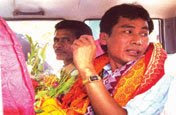Guwahati, Feb 6: The multiethnic fabric of Asom is under siege with the aspirations of different communities and groups showing no signs of a decline despite attempts at devolution of power to the grassroots level.
A state of 26 million people, Asom already has autonomous councils, which are politico-administrative structures, for ethnic groups like the Bodos, Karbis, Thengal Kacharis, Rabhas, Dimasas and few others. It appears now that every single community in the state is seeking autonomy.
At a political conclave this week in the eastern district town of Tinsukia, the Moran community has raised the demand for a separate state for the group.
“We have been demanding Scheduled Tribe status for our community, but the government seems to be in no mood to accept our plea. We may now have to seek a separate state for ourselves,” said Srikumar Dahotia, a Moran community leader.
The matter of concern is that even in areas where the dominant ethnic group has already been granted autonomy, there are demands for safeguarding of rights from minorities living there.
The case in point is the non-Bodos living in the area under the autonomous Bodoland Territorial Council (BTC). Muslims in the Bodo-dominated western and northern Asom areas, which fall under the BTC, have demanded a Minority Development Board within the Council to uplift the status of Muslims living there.
“Besides setting up the Board, there should be 30 per cent job reservation for the linguistic minorities in the BTC area,” a memorandum to the BTC leadership by the Bodoland Minority Students’ Union this week said. The BTC was set up after the Bodo Accord of 2003 between the rebel Bodo Liberation Tigers (BLT) and the central government. The agreement brought the curtains down on the violent separate state movement led by the BLT although its rival, the National Democratic Front of Boroland (NDFB), is still seeking a separate Bodo homeland.
In terms of the 2003 Bodo Accord, the BTC has been granted an annual allocation of Rs 1 billion with which the leaders running the Council can pursue development programmes in the Council area. That has not satisfied sections of non-Bodos living in the BTC area, leading to fresh demands for safeguards.
A state of 26 million people, Asom already has autonomous councils, which are politico-administrative structures, for ethnic groups like the Bodos, Karbis, Thengal Kacharis, Rabhas, Dimasas and few others. It appears now that every single community in the state is seeking autonomy.
At a political conclave this week in the eastern district town of Tinsukia, the Moran community has raised the demand for a separate state for the group.
“We have been demanding Scheduled Tribe status for our community, but the government seems to be in no mood to accept our plea. We may now have to seek a separate state for ourselves,” said Srikumar Dahotia, a Moran community leader.
The matter of concern is that even in areas where the dominant ethnic group has already been granted autonomy, there are demands for safeguarding of rights from minorities living there.
The case in point is the non-Bodos living in the area under the autonomous Bodoland Territorial Council (BTC). Muslims in the Bodo-dominated western and northern Asom areas, which fall under the BTC, have demanded a Minority Development Board within the Council to uplift the status of Muslims living there.
“Besides setting up the Board, there should be 30 per cent job reservation for the linguistic minorities in the BTC area,” a memorandum to the BTC leadership by the Bodoland Minority Students’ Union this week said. The BTC was set up after the Bodo Accord of 2003 between the rebel Bodo Liberation Tigers (BLT) and the central government. The agreement brought the curtains down on the violent separate state movement led by the BLT although its rival, the National Democratic Front of Boroland (NDFB), is still seeking a separate Bodo homeland.
In terms of the 2003 Bodo Accord, the BTC has been granted an annual allocation of Rs 1 billion with which the leaders running the Council can pursue development programmes in the Council area. That has not satisfied sections of non-Bodos living in the BTC area, leading to fresh demands for safeguards.
“We are not averse to further devolution of powers, but community leaders chosen or elected to govern their own people through autonomous councils must deliver. Otherwise, frustration will never end,” said Chief Minister Tarun Gogoi.
The question that analysts ask is whether demands for autonomy and self rule would end if every community in Assam was to be granted an autonomous council. The answer is a unanimous no. “This is primarily a governance issue. Poor governance is the main trigger factor for ethnic groups or sub-groups clamouring for autonomy. Such demands from newer groups are here to stay,” said Bibhu Prasad Routray of the Institute for Conflict Management, New Delhi. (IANS)




No comments:
Post a Comment